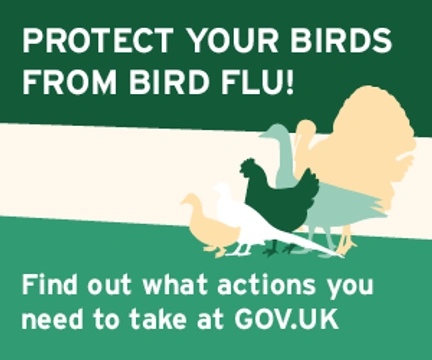
What is a bird flu?
In partnership with Defra
Avian influenza more commonly known as bird flu, is a highly contagious viral disease. It affects the respiratory, digestive or nervous system of many species of birds.
Current situation
The UK is currently experiencing the biggest bird flu outbreak we’ve ever had.
On 17 October 2022, a UK-wide Avian Influenza Prevention Zone (AIPZ) came into force, meaning that those who keep birds must, by law, follow strict biosecurity rules to prevent bird flu from spreading. In England and Wales housing measures have also been introduced to try and protect poultry and captive birds from catching avian influenza.
Birdkeepers in Wales must also complete a mandatory biosecurity self-assessment checklist: https://www.gov.wales/avian-influenza
Helping to prevent the spread of bird flu
It doesn’t matter how many, or what kind of chicken and birds you keep, you must take action to keep them safe from bird flu.
Lapses in biosecurity are a major reason for the large number of bird flu outbreaks across the UK and here are some simple measures you can take to protect your birds against bird flu:
- Wash your hands before and after tending to your birds.
- Use dedicated footwear to tend to your birds.
- Regularly clean and disinfect equipment and hard surfaces.
- Make sure you have proper pest control in place (rodents can carry the virus into your bird keeping areas on their fur and paws).
- Store bedding under cover so that it is protected from wild birds.
- Maintain buildings to keep water and wild birds out.
- Keep chickens and turkeys separate from ducks and geese
- Place birds’ feed and water in fully enclosed areas that are protected from wild birds
- Put fencing around outdoor areas where birds are allowed and limit their access to ponds or areas visited by wild waterfowl
- Make your premises unattractive to wild birds by using scarecrows, foils or streamers.
- Reduce the movement of people, vehicles or equipment to and from areas where poultry are kept.
For further advice on how to prevent and stop the spread of bird flu visit GOV.UK
How to house your chickens when housing measures are in place
Birdkeepers in England and Wales must house their birds. Follow these tips about housing to protect them from bird flu:
- If you don’t have a purpose built building you could adapt existing buildings such as outbuildings, sheds or garages or build a lean-to. Ensure there is adequate light and ventilation, and any openings are netted to prevent wild birds entering
- If you can’t house your birds, use netting to keep wild birds away from your flock.
- Keep ducks and geese separate from other poultry.
Find out more by visiting https://www.gov.uk/guidance/bird-flu-avian-influenza-housing-your-birds-safely
Other steps you can take to be prepared
- Sign up to receive free bird flu alerts from the Animal and Plant Health Agency. It’s quick and easy https://www.gov.uk/guidance/apha-alert-subscription-service
- Register your chickens or birds with the Animal and Plant Health Agency. If you own over 50 birds, it is a legal requirement. They can let you know about outbreaks of bird flu in your area, helping you to keep your birds safe. Registration is easy. Visit: gov.uk/poultry-registration
To keep up to date with the latest situation, visit https://www.gov.uk/government/news/bird-flu-avian-influenza-latest-situation-in-england.



